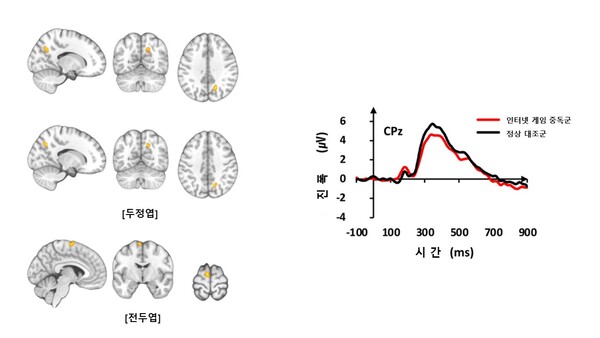Korean doctors have once again confirmed that online gaming addiction has a negative impact on overall brain function.
The study draws additional interest as it came after the World Health Organization granted an official disease code to “Gaming Disorder” in 2019, and Korea is scheduled to follow the WHO’s example by 2025.

Samsung Medical Center (SMC) said Thursday that its research team, led by Professor Choi Jung-seok of the Department of Psychiatry, has reaffirmed this after conducting two related tests – functional MRI and event-related potential (ERP) electroencephalography (EEG).
To determine the effects of gaming addiction on the brain, the team conducted functional MRI, which measures brain activity by detecting changes related to cerebral blood flow, and event-related potential ERP electroencephalography, which records the brain's electrical responses to certain stimuli from a scalp area, on 26 patients treated for online game addiction aged 18 to 39 and 25 normal controls.
The threshold for online gaming addiction was set at those who played four hours or more a day and more than 30 hours a week. The control group consisted of people who could control their gaming time to less than two hours daily.
Depending on the nature of the test, functional MRI looked at the activity of brain regions to determine dysfunction, while EEG was used to examine the function of different brain regions over time.
By performing both tests, the researchers compensated for the shortcomings of functional MRI, which is limited in time, and EEG, which is limited in space, to improve accuracy. The functional MRI was performed while the subjects were awake, resting, and not thinking about anything. During the EEG, they responded by pressing a button to stimuli heard through earphones.

The results showed that compared to controls, patients showed increased brain activity in the frontal and parietal regions on functional MRI and decreased EEG signal amplitudes in response to auditory stimuli. There was also a significant positive correlation between functional MRI and EEG responses in the right inferior temporal gyrus, right orbitofrontal gyrus, and some occipital regions. In contrast, the left hippocampus and right amygdala showed significant negative correlations.
Depending on the type of test, certain regions were hypersensitive with positive correlations, while others were desensitized with negative correlations, suggesting that gaming addicts have an imbalance in information processing between brain structures. The occipital lobe, where the most interactions have been found, is home to the visual center, which analyzes the shape, position, and motion of objects seen with the eyes.
The right inferior temporal gyrus, located in the temporal lobe, plays a central role in cognition, controlling semantic memory and certain aspects of language, vision, perception, and even sensory functions. The orbitofrontal gyrus, located behind the eyes below the frontal lobe, is part of the "lateral orbitofrontal cortex," which is activated in situations involving punishment and contributes to appropriate social behavior.
Changes in brain activity are observed in the cortex of several brain regions, including the temporal and occipital lobes, and the interaction of functional MRI and electroencephalography responses indicates inefficient cognitive processing and, consequently, reduced brain function.
The best example of this is the interrelationship between the hippocampus and amygdala, which has an important impact on the memory and learning of emotions and responds to the desire for addiction. The hippocampus and amygdala were found to be weakened in game addicts, depending on their accumulated online gaming habits and emotional memories.
"The study affirms the impact of gaming addiction on genuine cognitive function and emotional processing,” Professor Choi said. “Considering this effect on brain function, we encourage individuals to engage with online games as a healthy hobby rather than becoming overly immersed in them."

